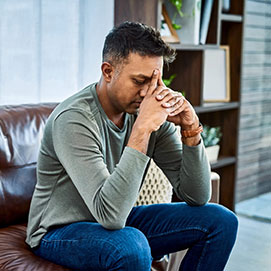How to Be a Better Friend: Guiding Tips from a Psychologist

June 20, 2023
It’s nice to have friends with whom you can enjoy a cup of coffee, a phone call or text exchange to share news, or vent about the latest happenings at work. But friendships are more than just surface level. In fact, various scientific studies have shown that friendships have health benefits, including improving emotional well being, reducing stress and building resilience to cope with life’s challenges.
“Friendships increase our overall sense of happiness and emotional health. They are good for the soul,” says Tara Lally Ph.D., supervising psychologist at Ocean University Medical Center.
So how can we make these vital relationships stronger? Dr. Lally provides these six tips to help you be a better friend:
-
Mirror what you want.
“Consider what you want in a friendship,” says Dr. Lally. Would you like your friends to be more available or engaged when you are together? Do you want more open communication? What you seek can be a great guide as to what you can provide in your friendships.
-
Practice active listening.
Active listening is more than just processing the words someone is saying. When a friend is speaking, don’t just focus on and prepare what you’re going to say next—or compare it to a similar situation you experienced. Engage with what the person is saying, and look at what their body language is conveying.
“It’s important to be a generous listener, “lean in” and notice what’s not being said as well as the words themselves,” says Dr. Lally, including a person’s eye contact, facial expressions, tone of voice and posture.
-
Address any disconnects and ‘clear the air.’
Over the last few years, the world has drastically changed, and to some, it may feel divided due to the pandemic, societal unrest and general politics. This may have caused tension in some relationships.
“Address these disconnects and communicate about what you may need in the friendship,” Dr. Lally suggests. Clearing the air can be scary and difficult, but it can help move relationships to a stronger, healthier place. The friendship was most likely based on a lot of common interests and common ground, so consider all you share whenever a friendship hits a bump in the road.
-
Know when to let it go, and that it’s okay.
Sometimes the best course of action for you and your friend is to move on. Dr. Lally says, “It’s OK to outgrow people.” It’s a natural process of life. “You may grieve the loss,” she continues, but while friendships like any relationship require some work they should not be draining. Moving on from someone doesn’t make you or them a bad person.
-
Understand the quality vs. quantity of friendships.
The rise of social media has distorted the perception and general definition of a “friend.” Being a friend is more than just liking their post and retweeting their trite reflections. “Think about an authentic connection and who you want to share your life moments with,” Dr. Lally says. The number of “friends'' listed on your social media accounts doesn’t necessarily equate to meaningful and healthy friendships. “You need to invest deeply and sincerely in relationships that are mutual and valued by both parties, and it isn’t realistic to believe you can truly connect in a personal and authentic way with 500 people,” Dr. Lally says.
-
Celebrate others’ wins, and be there to pull them up when they are down!
When your friends succeed, celebrate their success openly and wholeheartedly. Others’ success is about them; it’s not a time to compare yourself or feel self-conscious that you haven’t reached all your goals and dreams.
When people you care about experience loss, setbacks or challenges that are weighing on them, reach out in any way you can. Don’t worry about saying the wrong thing or not knowing what to say. Often just saying, “I care about you, I am here for you, and you are not alone,” can be comforting and give them strength.
Revel in your friend’s good fortune. “This energy is important to build a better friendship,” says Dr. Lally. It shows your true support for your friends. Conversely, when they are feeling overwhelmed or defeated, your friendship can be the emotional nourishment they need.”
Next Steps & Resources:
- Meet our source: Tara Lally Ph.D.
- To make an appointment with a behavioral health specialist near you, call 800-822-8905 or visit our website.
The material provided through HealthU is intended to be used as general information only and should not replace the advice of your physician. Always consult your physician for individual care.





